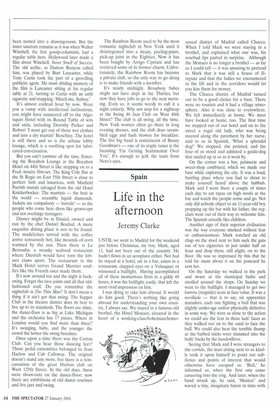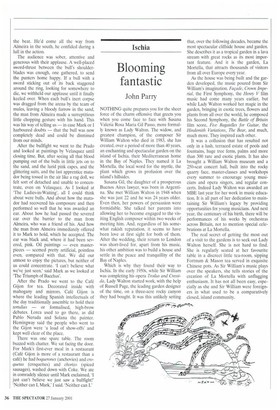Life in the afternoon
Jeremy Clarke
UNTIL we went to Madrid for the weekend just before Christmas, my boy, Mark, aged 11, had not been out of the country. He hadn't flown in an aeroplane either. Nor had he stayed at a hotel, sat in a bar, eaten in a restaurant, clapped eyes on a Velasquez or witnessed a bullfight. Having accomplished all of these momentous firsts in a giddy 48 hours, it was the bullfight, easily, that left the most vivid impression on him.
I was dying to take him abroad. It would do him good. There's nothing like going abroad for understanding your own country, I always say. We stayed in a famous old brothel, the Hotel Monaco, situated in the heart of a working-class/bohemian/homo
sexual district of Madrid called Chueca. When I told Mark we were staying in a brothel, and explained what one was, his rosebud lips parted in surprise. Although the Monaco is no longer a brothel — as far as I could tell — it was amusing to pretend to Mark that it was still a house of illrepute and that the ladies we encountered in the lift and in the corridors would let you kiss them for money.
The Chueca district of Madrid turned out to be a good choice for a base. There were no tourists and it had a village atmosphere. Also it was close to everywhere. We felt immediately at home. We must have looked at home, too. The first time we stepped out of our hotel and on to the street a regal old lady, who was being steered along the pavement by her nurse, said to us in Spanish, 'What a splendid dog!' We stopped, she pointed, and the four of us stood and admired a guide-dog that smiled up at us as it went by.
On the corner was a bar. patisserie and sweet-shop combined, which we made our base while exploring the city. It was a loud, bustling place where you had to shout to make yourself heard above the hubbub. Mark and I went there a couple of times each day to eat tapas on high stools at the bar and watch the people come and go. Not only did nobody object to an 11-year-old boy propping up the bar with his father, the regulars went out of their way to welcome him. The Spanish actually like children.
Another sign of their superior civilisation was the way everyone smoked without fear or embarrassment. Mark watched an old chap on the stool next to him suck the guts out of ten cigarettes in just under half an hour and drop them, still alight, on to the floor. He was so impressed by this that he told his mum about it on the postcard he sent her.
On the Saturday we walked in the park and swam at the municipal baths and strolled around the shops. On Sunday we went to the bullfight. I managed to get two barrera (ringside) seats at face value. It was a novillada — that is to say, six apprentice matadors, each one fighting a bull that was slightly under-age and/or physically defective in some way. We were so close to the action we could see the fear in these lads' faces as they walked out cm to the sand to face the bull. We could also hear the terrible thump as the barbed sticks were slammed into the bulls' backs by the banderilleros.
Seeing that Mark and I were strangers to the corrida, the man sitting next to us kindly took it upon himself to point out subtleties and points of interest that would otherwise have escaped us. 'Bull,' he informed us, when the first one came careering into the ring. And later, when the band struck up, he said, Musica!' and waved a tiny, imaginary baton in time with
the beat. He'd come all the way from Almeira in the south, he confided during a lull in the action.
The audience was sober, attentive and generous with their applause. A well-placed sword-thrust between the bull's shoulderblades was enough, one gathered, to send the punters home happy. If a bull with a sword sticking out of its back staggered around the ring, looking for somewhere to die, we withheld our applause until it finally keeled over. When each bull's inert corpse was dragged from the arena by the team of mules, leaving a bloody furrow in the sand, the man from Almeira made a surreptitious little chopping gesture with his hand. This
was his way of telling us in case Mark or I harboured doubts — that the bull was now completely dead and could be dismissed from our minds.
After the bullfight we went to the Prado and looked at paintings by Velasquez until closing time. But, after seeing all that blood pumping out of the bulls in little jets on to the sand, and the lurid pink capes, and the glittering suits, and the last apprentice matador being tossed in the air like a rag doll, we felt sort of detached and unable to concentrate, even on Velasquez. As I looked at The Ladies-in-Waiting', all I could think about were bulls. And about how the matador had recovered his composure and then performed so well that he was awarded an ear. About how he had passed the severed ear over the barrier to the man from Almeira, who was a friend of his. And how the man from Almeira immediately offered it to Mark to hold, which he accepted. The ear was black and, where it had been severed, pink. Oil paintings — even masterpieces — seemed pretty artificial, pointless even, compared with that. We did our utmost to enjoy the pictures, but neither of us could concentrate. 'I can't believe what we've just seen,' said Mark as we looked at 'The Triumph of Bacchus'.
After the Prado we went to the Cafe Gijon for tea. Decorated inside with mahogany and mirrors, Café Gijon is where the leading Spanish intellectuals of the day traditionally assemble to hold their tertulias — or formalised, high-brow debates. Lorca used to go there, as did Pablo Neruda and Solana the painter. Hemingway said the people who went to the Gijon were 'a load of show-offs' and kept well clear of the place.
• There was one spare table. The room buzzed with chatter. We sat facing the door. For Mark's first-ever meal in a restaurant (Café Gijon is more of a restaurant than a café) he had boquerones (anchovies) and croquetas (croquettes) and chorizo (spiced sausages), washed down with Coke. We ate in comradely silence until Mark exclaimed, 'I just can't believe we just saw a bullfight!' 'Neither can I, Mark.' I said. 'Neither can I.'























































































 Previous page
Previous page